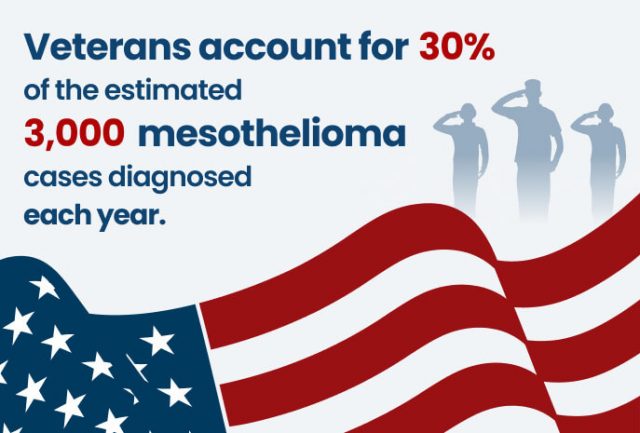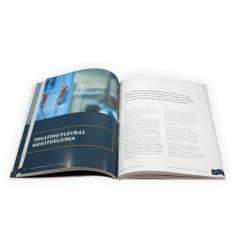Veterans and Mesothelioma
Pleural mesothelioma affects veterans at a disproportionate rate compared to the general public. Military asbestos exposure used to be a common and uncontrolled hazard for service members. Veterans with service-connected mesothelioma can file a VA claim for health care and disability compensation.
Asbestos in the Military
From the 1930s to the 1970s, the U.S. military used thousands of asbestos-containing products to strengthen, insulate and fireproof military bases, ships, aircraft and land vehicles. Servicemen and servicewomen could encounter asbestos in base housing and almost everywhere they worked.
When asbestos-containing materials are installed or disturbed through daily use or maintenance, asbestos fibers become airborne. Persistently breathing in these fibers can cause them to build up in the lining of the lungs or abdomen, which can eventually lead to mesothelioma.
Medical officers were raising concerns about the dangerous effects of asbestos exposure as early as 1939. Asbestos was cheap and versatile, though, and because asbestos-related diseases take decades to develop, it was easy for asbestos suppliers to downplay the risks of using the toxic mineral.
Today, the medical evidence linking asbestos to cancer is indisputable.

For example, a 2019 study published in the International Journal of Radiation Biology found that veterans who worked in high-risk job categories — such as machinist’s mates, boiler technicians, pipe fitters and firemen — are six times more likely to die from mesothelioma than others.
Recognizing this, the U.S. Department of Veterans Affairs provides special benefits to veterans who develop pleural mesothelioma because of military asbestos exposure.
Who Is Most at Risk?

Every man and woman who served in the U.S. military prior to the 1980s may have been exposed to asbestos. The veterans most at risk of mesothelioma are those who worked or lived in asbestos-contaminated conditions on a regular basis.
Navy
- Boiler technicians
- Machinist’s mates
- Ship insulators
Navy service members experienced the most toxic exposure because of the pervasive use of asbestos fireproofing and insulation in the poorly ventilated interiors of ships. Sailors who worked in shipyards, engine rooms and gun turrets regularly handled asbestos-containing materials.
Marine Corps
- Construction tradesmen
- Building insulators
- Vehicle mechanics
Marines experienced high levels of asbestos exposure while working and living beside sailors on Navy ships. They also worked with asbestos products while doing maintenance on vehicles and military buildings.
Army
- Carpenters
- Miners
- Pipe fitters
Army bases were built with asbestos-containing construction materials of all kinds — it was normal for an Army installation to have asbestos in its flooring, walls, ceiling tiles, roof shingles, insulation, plumbing and HVAC system. Army vehicles were made with asbestos parts as well.
Air Force
- Aircraft mechanics
- Electricians
- Firefighters
Air Force planes and weapon systems were built with a variety of asbestos-containing components, which made asbestos exposure a risk for mechanics and electricians. In addition, military firefighting gear was commonly made of asbestos cloth, which released toxic fibers through wear and tear.
Benefits for Veterans with Pleural Mesothelioma
The Veterans Department of the Pleural Mesothelioma Center provides free assistance to military families who need to file a VA claim based on a mesothelioma diagnosis.
Our Patient Advocates are accredited by the Department of Veterans Affairs, and we can also help military families locate medical specialists and other sources of financial assistance.

Disability Compensation
Veterans with a service-connected illness are eligible for disability compensation through the VA. The VA can accept mesothelioma and related conditions as service-connected, but proof of military asbestos exposure is required.
A mesothelioma diagnosis makes veterans eligible for the maximum compensation rate, which starts at about $3,000 per month and increases based on the number of dependents the veteran claims.
Dependency and Indemnity Compensation
Dependents and survivors of veterans who died from a service-related disease are also entitled to VA benefits. Spouses receive a basic monthly payment, plus an additional payment for dependent children if they require aid and assistance, or if they are house-bound.
VA Health Care
The VA health care system provides free mesothelioma treatment for service-connected cancer, and veterans can also apply for assistance with traveling to see a mesothelioma specialist. The VA hospitals in Boston, Los Angeles, Houston and Miami have doctors who specialize in asbestos-related diseases.
If a veteran’s mesothelioma diagnosis is not service-connected, they may still be eligible for subsidized VA health care if they meet low-income criteria.

Eligibility for VA Benefits
A person who served in the military and was discharged or released under conditions other than dishonorable may be eligible for VA health benefits and services.
Once the nature of a veteran’s discharge from military service is established, other eligibility requirements include:
- Length of military service
- Income level
- Number of dependents
- Available VA resources
- Proof of a diagnosis caused by military asbestos exposure
The key to filing a successful VA claim over pleural mesothelioma is convincing the VA that the majority of a veteran’s asbestos exposure was a direct result of their military service.
The veteran must provide documentation from a doctor stating the diagnosis is asbestos-related and was caused by military service. The veteran must also prepare a written asbestos exposure summary detailing the products and situations that caused the asbestos exposure.



